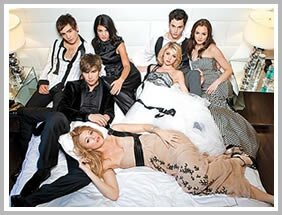New Study Looks at the Over-Sexualization of Teen Girls on TV
 Think about the television shows you watch the most. Are there any teen girls and young women in them? Now answer these questions:
Think about the television shows you watch the most. Are there any teen girls and young women in them? Now answer these questions:
- Are the teen characters shows ever shown in sexual situations?
- When teen characters are in sexual situations, do they seem to be positive ones or negative ones?
- Do the sexual situations happen in “unhealthy” situations (such as when a character is drunk, depressed, taken advantage of, feeling pressured)?
- Do the sexual situations happen within committed relationships?
- Are the sexualized incidents depicted as the punchline to a joke or in a humorous way at the girls’ expense?
These are the factors that the Parents Television Council looked at when conducting their study, “Tinseltown’s New Target: A Study of Teen Female Sexualization on Primetime TV,” which was just released last week. The study found that when underage female characters appear on screen: more sexual content is depicted; the teen girls show next to no negative response to being sexualized; more sexual incidents occur outside of any form of a committed relationship; and there is less accuracy in the TV content rating.
The PTC president Tim Winter says, “Storylines on the most popular shows among teens are sending the message to our daughters that being sexualized isn’t just acceptable, it should be sought after.”
The shows reviewed in the study focused on 14 different shows that are among the most popular for teens: The Office, NCIS, Two and a Half-Men, The Big Bang Theory, The Vampire Diaries, Grey’s Anatomy, Desperate Housewives, Lost, Family Guy, House, Glee, The Cleveland Show, American Dad, and The Simpsons.
How about the programs you watch? Do you think what you see is the best TV programmers can do? And if there is content you see that portrays teen girls and their sexuality in an unhealthy light, why do you put up with it? After all…if there were no audiences for these shows, the ratings would plummet and the networks would pull the plug. But when we watch, and say nothing, we’re perpetuating the idea that not only is what we’re seeing okay…it’s what we want.
Of course, there are shows that come along every now and then with strong female lead characters who break the mold and promote a strong sense of self (Freaks and Geeks, HUGE, etc.), but they’re few and far between. Much more prevalent are shows like Gossip Girl, which is about as risque as TV aimed at you can get. When shows like this become superpopular, programmers get the idea that those are the kinds of shows we need more of. And the cycle continues.
While programs that depict teen sexuality in unhealthy ways probably aren’t going anywhere, we as media consumers CAN have an impact on what shows stay on the air. We can write letters to the TV networks, rally the troops online, create a Facebook page for the cause, boycott shows that are failing girls.
But we need to be more than just vocal consumers…we need to be critical consumers of media. To know that the characters and storylines we’re sucked into don’t in any way, shape, or form, resemble REALITY, and that the shows we watch were created with the sole intention of SELLING us as an audience to advertisers.
So, what are your thoughts on how girls are portrayed on the shows that you watch?
Interested in learning more about the study? Your can read the PTC’s full report here.


